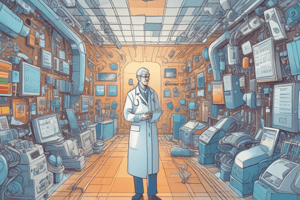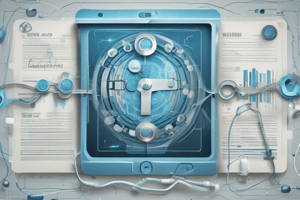Podcast
Questions and Answers
What is one of the risks associated with Electronic Health Records (EHRs)?
What is one of the risks associated with Electronic Health Records (EHRs)?
- Data breaches and cybersecurity threats (correct)
- Improved patient care and safety
- Enhanced data analysis and research capabilities
- Accurate and up-to-date patient information
What is the primary purpose of implementing secure communication and data sharing protocols in patient confidentiality?
What is the primary purpose of implementing secure communication and data sharing protocols in patient confidentiality?
- To reduce healthcare costs
- To protect patient privacy and trust (correct)
- To comply with laws and regulations
- To improve patient care and safety
Which of the following is a best practice for infection control?
Which of the following is a best practice for infection control?
- Implementing proper hand hygiene and personal protective equipment (PPE) use (correct)
- Decreasing the use of vaccination and immunization programs
- Increasing the number of healthcare workers in a patient's room
- Reducing the frequency of environmental cleaning and disinfection
What is the primary goal of medication error prevention?
What is the primary goal of medication error prevention?
What is a risk associated with inadequate data protection and encryption in patient confidentiality?
What is a risk associated with inadequate data protection and encryption in patient confidentiality?
What is a benefit of implementing Electronic Health Records (EHRs)?
What is a benefit of implementing Electronic Health Records (EHRs)?
What is a best practice for Electronic Health Records (EHRs) management?
What is a best practice for Electronic Health Records (EHRs) management?
What is a risk associated with infection control?
What is a risk associated with infection control?
What is a best practice for medication error prevention?
What is a best practice for medication error prevention?
Why is patient confidentiality important in healthcare?
Why is patient confidentiality important in healthcare?
Flashcards are hidden until you start studying
Study Notes
Risk Management for Healthcare Workers
Electronic Health Records (EHRs) Management
- Importance of EHRs:
- Accurate and up-to-date patient information
- Improved patient care and safety
- Enhanced data analysis and research capabilities
- Risks associated with EHRs:
- Data breaches and cybersecurity threats
- Inaccurate or incomplete data entry
- Technical issues and system downtime
- Best practices for EHRs management:
- Implement robust security measures (e.g., encryption, access controls)
- Regularly update and audit EHR systems
- Provide training on EHR use and data entry
Patient Confidentiality
- Importance of patient confidentiality:
- Protect patient privacy and trust
- Maintain confidentiality of sensitive health information
- Comply with laws and regulations (e.g., HIPAA)
- Risks associated with patient confidentiality:
- Unauthorized access or disclosure of patient information
- Inadequate data protection and encryption
- Failure to obtain patient consent
- Best practices for patient confidentiality:
- Implement secure communication and data sharing protocols
- Limit access to patient information on a need-to-know basis
- Conduct regular audits and risk assessments
Infection Control
- Importance of infection control:
- Prevent transmission of infectious diseases
- Protect patients and healthcare workers
- Reduce healthcare-associated infections
- Risks associated with infection control:
- Failure to follow proper hygiene and isolation protocols
- Inadequate sterilization and disinfection practices
- Insufficient vaccination and immunization programs
- Best practices for infection control:
- Implement proper hand hygiene and personal protective equipment (PPE) use
- Conduct regular environmental cleaning and disinfection
- Develop and implement effective infection control policies and protocols
Medication Error Prevention
- Importance of medication error prevention:
- Prevent patient harm and adverse events
- Improve patient safety and outcomes
- Reduce medication errors and near misses
- Risks associated with medication errors:
- Inadequate medication reconciliation and verification
- Failure to follow proper medication administration protocols
- Insufficient patient education and monitoring
- Best practices for medication error prevention:
- Implement barcode scanning and automated dispensing systems
- Conduct regular medication safety audits and risk assessments
- Develop and implement effective medication error reporting and learning systems
Risk Management for Healthcare Workers
Electronic Health Records (EHRs) Management
- EHRs provide accurate and up-to-date patient information, improving patient care and safety.
- EHRs enhance data analysis and research capabilities, facilitating better healthcare outcomes.
- Data breaches and cybersecurity threats pose significant risks to EHRs, compromising patient data confidentiality.
- Inaccurate or incomplete data entry can lead to incorrect diagnoses, treatments, and patient outcomes.
- Technical issues and system downtime can disrupt healthcare services and patient care.
Patient Confidentiality
- Patient confidentiality is essential for protecting patient privacy and trust.
- Maintaining confidentiality of sensitive health information is crucial for complying with laws and regulations like HIPAA.
- Unauthorized access or disclosure of patient information can lead to legal consequences and reputational damage.
- Inadequate data protection and encryption can compromise patient data confidentiality.
- Failure to obtain patient consent can lead to legal and ethical issues.
Infection Control
- Infection control measures prevent transmission of infectious diseases, protecting patients and healthcare workers.
- Proper hygiene and isolation protocols are essential for preventing healthcare-associated infections.
- Inadequate sterilization and disinfection practices can spread infections and compromise patient safety.
- Insufficient vaccination and immunization programs can lead to outbreaks and epidemics.
Medication Error Prevention
- Medication error prevention is critical for preventing patient harm and adverse events.
- Inadequate medication reconciliation and verification can lead to medication errors and near misses.
- Failure to follow proper medication administration protocols can result in incorrect dosing, timing, and routes of administration.
- Insufficient patient education and monitoring can lead to medication non-adherence and adverse reactions.
Studying That Suits You
Use AI to generate personalized quizzes and flashcards to suit your learning preferences.




